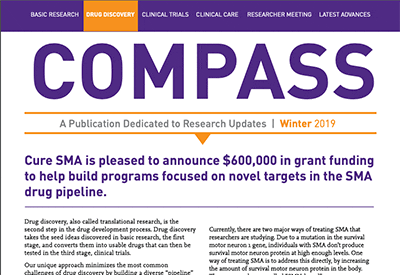Cure SMA has awarded a $150,000 research grant to Charlotte Sumner, MD, at Johns Hopkins University, for her project, “Testing the potential of SMN-AS1 as a therapeutic target in SMA.”
Dr. Sumner and her team have recently identified a long noncoding RNA (lncRNA) that represses the ability of SMN2 to make its template for protein production. This lncRNA, called SMN-AS1, has the potential to be a novel therapeutic target for SMA. To test this potential, Dr. Sumner and her team identified antisense oligonucleotides (ASOs) that suppress SMN-AS1 expression. When delivered to patient derived cells or primary neurons derived from SMA mice, these ASOs resulted in increases in SMN expression.
This grant to Dr. Sumner will allow for further optimization and development of ASOs directed at suppressing SMN-AS1, including using a new SMA mouse model in which SMN-AS1 has been deleted. If successful, these studies will strongly support further development of SMN-AS1 as a therapeutic target in SMA.
Meet Dr. Sumner
Who are you?
I am physician scientist who cares for adult patients with inherited neuromuscular diseases including SMA. My laboratory has been working on furthering our understanding of SMA since 2006 by evaluated cultured cells, animal models, and human tissues.
How did you first become involved with SMA research?
I first became involved in SMA when I was a postdoctoral fellow with Dr. Kenneth Fischbeck at the National Institute of Neurological Disorders and Stroke. In 2002, I had the opportunity to attend my first Families of SMA meeting. Although I am an adult neurologist and it was not necessarily a natural fit to work on SMA, the exposure to the research field and patient community during this meeting led me to focus the rest of my training and subsequent career on SMA.
What is your current role in SMA research?
Our laboratory investigates molecular and cellular mechanisms of SMA and tests novel treatments in preclinical models. We are interested in understanding how SMN expression is regulated and identifying novel strategies for activating SMN2 gene expression. We are also focused on defining the cellular abnormalities of motor neurons that cause their dysfunction and ultimate degeneration and whether other cell types contribute to SMA disease manifestations.
What do you hope to learn from this research project?
The objective of this application is to further assess the therapeutic potential of inhibiting the novel long noncoding RNA called SMN-AS1 as a novel treatment approach for SMA patients.
How will this project work?
We will evaluate SMN gene and protein expression during neural differentiation and development and disease outcomes in SMA mice in which the SMN-AS1 locus has been knocked out in the germline.
What is the significance of your study?
If successful, these results would support further investment in developing SMN-AS1 a novel therapeutic target that would synergize with the splice switching oligonucleotide Nusinersen. Our long term goal is to develop combinatorial treatment approaches in order to maximize therapeutic benefit for the most number of patients with SMA.
Basic Research Funding
This grant to Dr. Sumner is part of $1,325,000 in new basic research funding that we’re currently announcing.
Basic research is the first step in our comprehensive research model. We fund basic research to investigate the biology and cause of SMA, in order to identify the most effective strategies for drug discovery. We also use this funding to develop tools that facilitate SMA research.



